 Petzlover
Petzlover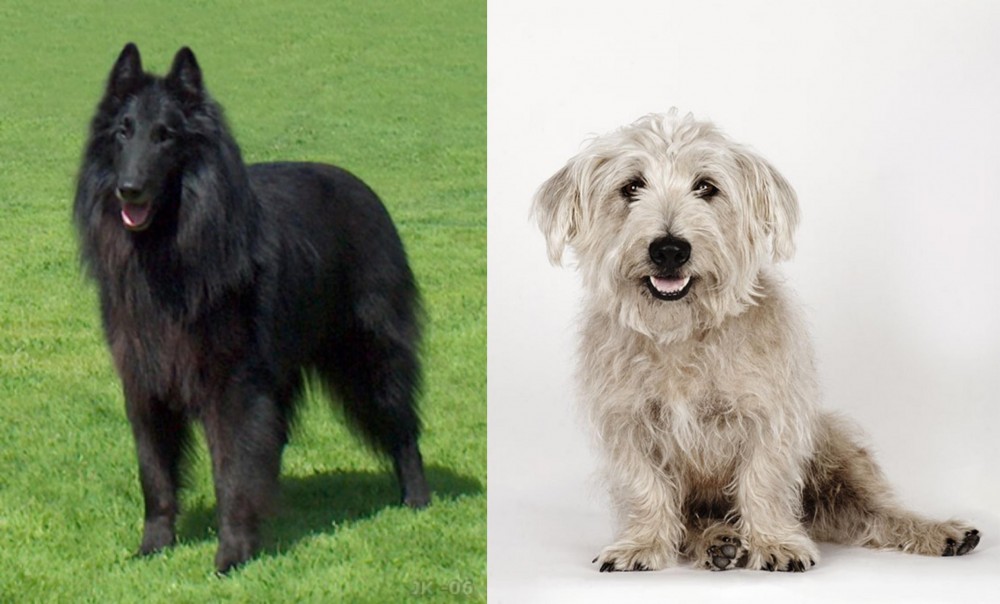 Belgian Shepherd Dog (Groenendael) is originated from Belgium but Glen of Imaal Terrier is originated from Ireland. Belgian Shepherd Dog (Groenendael) may grow 30 cm / 12 inches higher than Glen of Imaal Terrier. Belgian Shepherd Dog (Groenendael) may weigh 14 kg / 31 pounds more than Glen of Imaal Terrier. Both Belgian Shepherd Dog (Groenendael) and Glen of Imaal Terrier has same life span. Belgian Shepherd Dog (Groenendael) may have more litter size than Glen of Imaal Terrier. Belgian Shepherd Dog (Groenendael) requires High Maintenance. But Glen of Imaal Terrier requires Low Maintenance
Belgian Shepherd Dog (Groenendael) is originated from Belgium but Glen of Imaal Terrier is originated from Ireland. Belgian Shepherd Dog (Groenendael) may grow 30 cm / 12 inches higher than Glen of Imaal Terrier. Belgian Shepherd Dog (Groenendael) may weigh 14 kg / 31 pounds more than Glen of Imaal Terrier. Both Belgian Shepherd Dog (Groenendael) and Glen of Imaal Terrier has same life span. Belgian Shepherd Dog (Groenendael) may have more litter size than Glen of Imaal Terrier. Belgian Shepherd Dog (Groenendael) requires High Maintenance. But Glen of Imaal Terrier requires Low Maintenance
 Looking much like a pitch black German Shepherd dog, the Belgian Shepherd is a beautiful looking dog. Their roots go back to the 1800s to Groenendael, Belgium. This is where they were bred by a certain Nicolas Rose in 1910. The Groenendael is one of four different Belgian Sheepdog varieties but the Groenendael is sometimes treated as a distinct breed.
Looking much like a pitch black German Shepherd dog, the Belgian Shepherd is a beautiful looking dog. Their roots go back to the 1800s to Groenendael, Belgium. This is where they were bred by a certain Nicolas Rose in 1910. The Groenendael is one of four different Belgian Sheepdog varieties but the Groenendael is sometimes treated as a distinct breed.
They have always been used for their intelligence, serving for instance in the police force and being message carriers in war situations. Originally, Belgian Shepherds were used to herd livestock. It was in 1911 that the Groenendael was registered in the United States, and not much later the first Belgian Sheepdog Club of America formed. The breed was recognized by the American Kennel Club (AKC) in 1912.
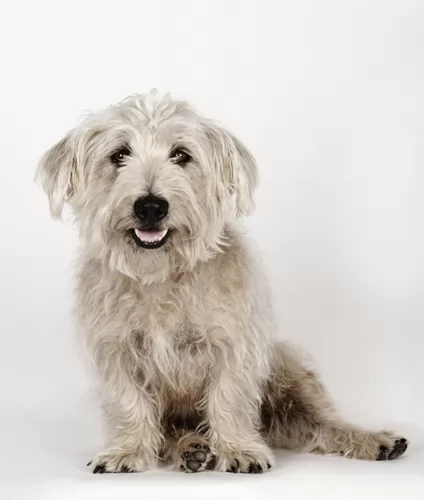 Hailing from Ireland and known also as the Wicklow Terrier or just Glen, the Glen of Imaal Terrier was used to get rid of rats, badgers and otters as well as being a good all-round farm dog.
Hailing from Ireland and known also as the Wicklow Terrier or just Glen, the Glen of Imaal Terrier was used to get rid of rats, badgers and otters as well as being a good all-round farm dog.
Using his strength, he was good at digging into burrows to root out badgers, but unlike other terriers, he wouldn’t go on and on yapping around his prey. He isn’t an excessive barker.
The terrier was recognised by the Irish Kennel Club in 1934 and later by the American Kennel Club in 2004. The Canadian Kennel Club recognized Glens in 2017.
 With his alert, bright brown eyes, the Groenendael, referred to often as the Belgian Sheepdog, has erect ears with a long, feathered tail. The straight, strong legs are also feathered. He is well proportioned, athletic and strong. He has a dense double coat, and this working dog’s coat is black, but you sometimes find some small white markings around his paws and muzzle. The size of the Groenendael is roughly 60-66cm at the withers with the females sometimes being slightly smaller. The weight of the dog is roughly 25–30 kilograms.
With his alert, bright brown eyes, the Groenendael, referred to often as the Belgian Sheepdog, has erect ears with a long, feathered tail. The straight, strong legs are also feathered. He is well proportioned, athletic and strong. He has a dense double coat, and this working dog’s coat is black, but you sometimes find some small white markings around his paws and muzzle. The size of the Groenendael is roughly 60-66cm at the withers with the females sometimes being slightly smaller. The weight of the dog is roughly 25–30 kilograms.
The Groenendael is an active, intelligent breed and training and socializing will be necessary to ensure he knows how to behave around his human family. He is a big, social dog and won’t do well when left alone day after day in the back yard. In fact he may even show signs of separation anxiety if you leave him indefinitely. He makes for an excellent family dog, just loving their companionship and he becomes very protective of them.
He is used to making use of his intelligence and therefore he will need mental stimulation as opposed to lying around all day. He gets on well with adults, children and other pets, but he needs to grow up with children and not be put among children when he is already an adult. He is loyal and loving to his human family, forming a deep bond, especially with just one member of the family.
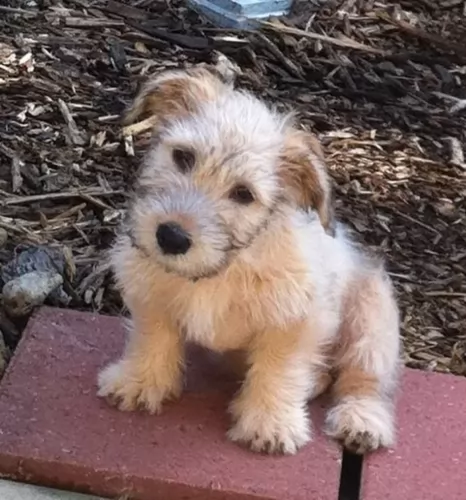 An interesting fact with the Glen of Imaal Terrier is that this is a dwarf breed, being a big sized dog on short legs, with the front feet turning out.
An interesting fact with the Glen of Imaal Terrier is that this is a dwarf breed, being a big sized dog on short legs, with the front feet turning out.
A typical Glen of Imaal Terrier stands at roughly 30 – 36cm and weighs up to about 16kg. Another interesting aspect with this dog is that it can take up to 4 years to reach maturity.
The head of this muscular dog is large, the ears are half erect, and while the tail has always been traditionally docked, it is often left long. The double coat of the dog is soft with the undercoat but he has a wiry outercoat. The color of the coat is essentially wheaten, tan or blue. The coat doesn’t shed much but some Glen owners strip excess hair a few times during the years.
Glen of Imaal terriers are energetic, easygoing and they make splendid pets for any family. He is more than happy to give up lying around for games and activity just to lie at his owner’s feet. He is an intelligent dog too and even though he is somewhat stubborn, he responds well to training and socialization. In fact training and socialization is important for every dog breed to prevent negative behavior and to ensure your pet is obedient.
 Your Belgian Shepherd is an intelligent, active, loyal companion for you. He is highly intelligent too, and will need the right owner who can meet his energetic needs. He therefore wouldn’t do well with in a small place where the owners are couch potatoes. He is a working dog and will require being kept busy.
Your Belgian Shepherd is an intelligent, active, loyal companion for you. He is highly intelligent too, and will need the right owner who can meet his energetic needs. He therefore wouldn’t do well with in a small place where the owners are couch potatoes. He is a working dog and will require being kept busy.
Provide him with good food, look after that thick, lustrous coat of his, provide him with a warm, dry place to sleep and plenty of exercise, love and attention and he will turn out to be the wonderful pet that makes him such a popular breed.
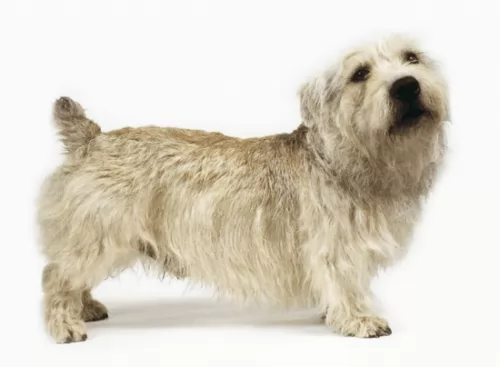 The Glen of Ismaal Terrier is more docile than other terrier breeds, but that doesn’t mean he isn’t feisty. He loves to play and is an adventurous dog, always on the lookout for exciting opportunities and to chase prey.
The Glen of Ismaal Terrier is more docile than other terrier breeds, but that doesn’t mean he isn’t feisty. He loves to play and is an adventurous dog, always on the lookout for exciting opportunities and to chase prey.
He is a good natured pet and he gets on well with adults, children and pets in the home. He can adapt well to life in the city or in the countryside so long as he is with his family members.
He isn’t a couch potato dog though, and wherever he lives, he will need a good amount of exercising. Treat him with the love and respect he craves, and you’ll have a wonderful canine companion.
 The Belgian Groenendael is a healthy, strong breed with no major health problems and with an average lifespan of 12-14 years.
The Belgian Groenendael is a healthy, strong breed with no major health problems and with an average lifespan of 12-14 years.
As with every dog breed, there will be some health issues to be aware of. Skin allergies, epilepsy, eye problems and hip- and joint dysplasia are some areas to look out for
Dental disease for instance, is a common problem with pets, and your Belgian Shepherd can have serious problems with their teeth. Tartar build-up on the teeth ca take you down a trail of infections and gum disease. If you don’t want to make use of a special canine toothbrush and toothpaste, your vet will do it for you.
Your Groenendael will also be susceptible to ticks, fleas and bacterial and viral infections. As a puppy of 6 – 8 weeks, vaccinations for parvo, rabies, and distemper will be necessary. You’ll also need to be generally watching your pet’s health and to get him to the vet when he shows signs of being run-down and ill.
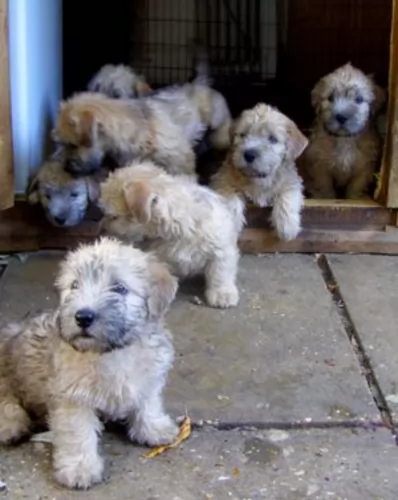 The Glen of Imaal Terrier is a feisty, healthy breed, particularly when he gets the best food there is, then he is not likely to get ill easily.
The Glen of Imaal Terrier is a feisty, healthy breed, particularly when he gets the best food there is, then he is not likely to get ill easily.
However, just like other dogs, he can be prone to certain health conditions such as hip dysplasia. When a dog is diagnosed with hip dysplasia, the socket part of the joint is poorly developed, so that is causes abnormal friction.
Inflammation and pain can be the result and your dog can become lame. Unfortunately, rapid weight gain with puppies can put more stress on the hips, and diets without the right balance of vitamins and minerals can be bad for good bone development.
 The Groenendael has a double coat and because it is also fairly long, his black coat may well be high maintenance and brushing every 2nd day will be necessary to keep the coat unmatted and to also get rid of those loose hairs. In fact, heavy shedding is part of this breed’s life and while heavy shedding happens twice a year, light shedding continues throughout the year. Sometimes is may be necessary to send him to a dog grooming parlour to snip his hair and to wash it.
The Groenendael has a double coat and because it is also fairly long, his black coat may well be high maintenance and brushing every 2nd day will be necessary to keep the coat unmatted and to also get rid of those loose hairs. In fact, heavy shedding is part of this breed’s life and while heavy shedding happens twice a year, light shedding continues throughout the year. Sometimes is may be necessary to send him to a dog grooming parlour to snip his hair and to wash it.
A healthy, quality diet it absolutely imperative. Speak to your vet about the best kind of wet- or dry food suited to an energetic breed like this and appropriate to his age. You need to include raw meat into your pets diet every day now and then to avoid skin problems. Always ensure a bowl of clean, cool water is available, The bowl will need to be washed out every other day.
make sure his ears are cleaned. Once again you have to be careful when prodding in a dog’s ear and your veterinarian will show you how.
keep him well exercised with long walks and ball games.
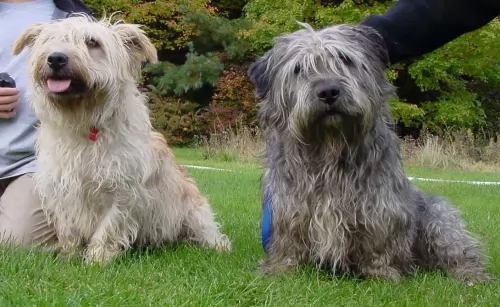 Caring for a Glen of Imaal isn’t going to be a huge job. This is what makes him such a wonderful pet as he is a straightforward pet, requiring little more than a brush to avoid the hair matting.
Caring for a Glen of Imaal isn’t going to be a huge job. This is what makes him such a wonderful pet as he is a straightforward pet, requiring little more than a brush to avoid the hair matting.
Check his ears, teeth and nails from time to time to ensure he is always in tip top condition.
If you intend making use of the convenience of commercially manufactured dog foods, the top quality one will provide you with balanced nutrition for your Glen and you can mix in some cooked brown rice, vegetables and chicken from time to time.
The Glen of Imaal Terrier is a small-breed dog and, he should be offered dog food that has been specially formulated for small, energetic dog breeds. You can also add in a little bit of raw meat into his kibble as a treat as this is important for keeping him free of skin allergies.
Make sure he always has a bowl of fresh, cool drinking water.